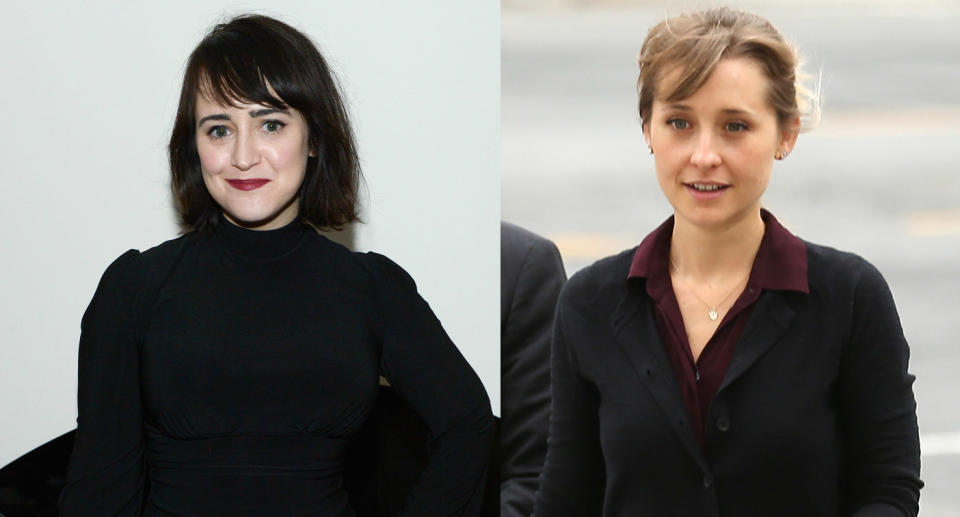Mara Wilson on why cults like Nxivm prey on child stars — like her former friend Allison Mack
Mara Wilson can see how Allison Mack got wrapped up in Nxivm. Wilson, a ’90s child star who was featured in hits like Matilda, Mrs. Doubtfire, and Miracle on 34th Street, penned an essay for Elle explaining why child actors — like herself and Mack — make for ideal cult targets.

Child actors “make great acolytes,” writes Wilson. “It’s hard to be an actor and not be spiritual, or to get vulnerable.”
Mack is best known for her starring role in Smallville, but is more synonymous nowadays for her alleged involvement in NXIVM’s secret sex cult. Wilson knew Mack during their early days in Hollywood, writing that they “were never close friends” but “moved in the same circles.”
“We were both child actors in L.A. in the late ’90s and early 2000s, and we both loved to do volunteer work,” Wilson reveals. “We first met at a charity event when I was about 10, and I liked her immediately.”
They hosted a Christmas party at a facility for young girls who had been sexually abused — the dark irony of which is not lost on Wilson now. Mack has been charged with sex trafficking, sex trafficking conspiracy, and conspiracy to commit forced labor. Mack is accused of branding women with her and Nxivm leader Keith Raniere’s initials and has been accused of directing her “slaves” to engage in sexual acts with Raniere.
That’s not the person Wilson remembers: “[Allison] was warm and friendly, with a sincere, winsome smile. I would see her around a few more times after that, but from then on, I mostly saw her on TV. … When she became a series regular on Smallville, I was genuinely happy for her. Couldn’t happen to a nicer girl, I thought.”
Months ago, Wilson saw the headlines that her former friend was involved in an alleged cult.
“At first, I struggled to reconcile my memory of the sweet, smiling girl with the woman who had allegedly abused other women. She had seemed so eager to help others. If she really had done all that, had I just been mistaken? Had I ever really known her?” Wilson writes. “It was a shock to me.”
But it wasn’t a shock that a child actor might end up in this kind of position.
“People also tend to turn to spirituality in times of uncertainty, and there is no career more uncertain than acting. … You need to have something to believe in,” she writes. “Sensitive, spiritual, soul-searching. It’s everything an organization like NXIVM could want.”
Wilson explains how traits of being a successful child actor could push one towards something like Nxivm: You are trained to be obedient and thrive in a structured environment. She remembers the struggle of acclimating back into school as a youth.
She explains, “There was too much to remember on my own, too many choices to make, too many opportunities for failure. Even recess felt daunting. I never would have admitted it, but I missed the strict rigor of a film set. Do what you’re told, and there’s no way you can fail.”
Theater school helped Wilson get the balance of both worlds, but she wonders “what I would have done if I hadn’t had that experience.”
Wilson — who has appeared on TV about a dozen times since 1999 — notes that she was recently offered a role in the controversial anti-abortion film 1973, which is currently in production: “Why were they sending this to me, I wondered?” It’s the second script centered around Christian beliefs she’s been sent recently, and both targeted former child stars.
“I sensed a pattern there. It’s not without precedent; Kirk Cameron famously became a conservative Christian after becoming disenchanted with Hollywood, and Angus T. Jones spoke out against the sins of Two and Half Men,” she writes. “But this was not the case with me.”
Just because I’m a has-been doesn’t mean I want to be in your right-wing Christian movie
— Mara “Get Rid of the Nazis” Wilson (@MaraWilson) May 24, 2018
Wilson adds, “People expect actors who don’t act as much anymore to be lost. It’s a narrative they want to craft for us: that we are struggling and in need of guidance, that we have consciously turned away from Hollywood. If we’re struggling with mental illness and addiction, so much the better. They want to be the ones to show us the way. They want us to be their success story.
“Allison spent ten years on the set of Smallville. She was a recognizable face, with a steady fan base. She was probably used to being surrounded by a cast and crew that must have come to feel like family, for ten years. Perhaps, like me, she craved structure, validation, and to feel like she was a part of something. It in no way excuses what she has allegedly done, but it might explain it.”
Wilson concludes by declaring: “This is not to say I feel empathy for [Allison.]”
Read more from Yahoo Entertainment:

